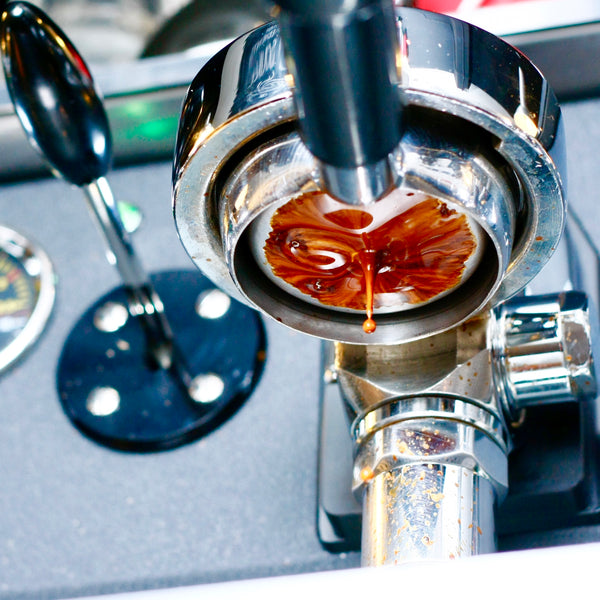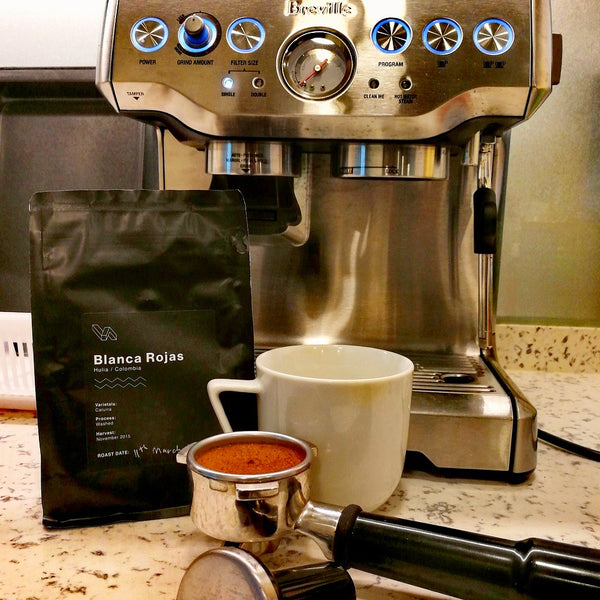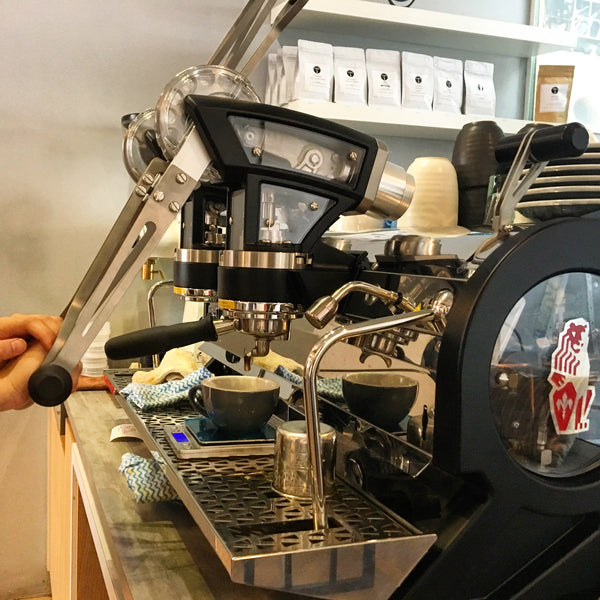How To Brew Delicious Espresso At Home

Espresso brewing can be challenging and frustrating. But when got it right, it's the happiest and rewarding moment ever!
This post is about how to dial in your espresso and get the best shot in every brew.
To start off, we are breaking this topic into two sections
- Brew Ratio
- Grind Size
Brew Ratio
If your espresso taste kinda watery, probably the brew ratio isn’t right (tho could be other reasons, but will get to that later)
Brew ratio is the multiple of dosage. If your dose is 20g coffee and output espresso is 40g, that’s a multiple of 2 and brew ratio is 1:2.
To start, we strongly recommend brewing with only ONE fixed dosage at all time! The easy way is to follow the espresso basket size! If it’s an 18g basket, just stick to 18g for all your espresso brew.
The espresso basket is designed to have a good amount of space between the shower screen and puck of ground coffee. If you follow the amount of coffee for espresso basket, this gives enough space for water to fill up and extract coffee more evenly (yes, you have to level & tamp evenly as well!)
By fixing one variable (dosage), you can focus on adjusting brew ratio and grind size easily. Also, you may get an extra 1-2 cups of espresso for that =)
What’s the perfect brew ratio?
It depends on the roast level of coffee! The general rule, the darker the roast, the shorter the espresso.
For Dark Roast coffee, go for 1 : 1.5
For most Espresso Blend (to pair with milk), go for 1 : 1.8
For Medium Light Espresso Roast (mostly single origins), go for 1 : 2 or more.
Darker roast coffees are easily burnt and super bitter with a longer pull espresso. Whereas lighter roast coffees have lots of delicate flavours, a longer pull will result to a much sweeter and balanced cup.
Yes, for espresso brewing, every gram counts! That's why you definitely need a weighing scale for that.
A top tip! Check with roaster for the ideal brew ratio! Roasters usually calibrate and roast coffee to suit a specific ratio. Also, you can keep the guessing work to absolutely minimal and just focus on grind size!
Grind Size
After fixing your dosage and decided on brew ratio, the next thing to consider is the grind size!
Different coffee requires a different grind size. It’s impossible to have 1 grind setting for all coffee unless you are in luck! Here are few indicators to know whether you are on the right grind size
First is the flow rate. The starting flow should be two thin strips on the double spout and slowly gets faster. If the espresso is flowing like a waterfall at the beginning, you’ll need to grind finer and slow down the flow. Imagine water pass through a glass of rocks is faster than a glass of sand.
Second is time. Your espresso should start flowing about 5-10 seconds you start the shot and hit the target brew ratio anywhere between 20-40 seconds, depending on coffee. Brew time outside the range is very likely under or over extract.
Lastly, of course, taste it! A good espresso is well balanced, start with delicate acidity and slowly turn into a long-lasting sweet aftertaste.
If espresso tastes sour all the way (under-extract), grind finer. Bitter and dry long aftertaste (over-extract), grind coarser. The bottom line, if the aftertaste is unpleasant, pretty sure the grind size is at the wrong one.
Don't forget to taste your espresso with a non-heated cup! There you'll get a more accurate tasting as our palate tastes the best at body temperature. Your espresso definitely taste better as espresso cools down!
A top tip! Sometimes you’ll notice that the grind size is the pretty much right there, ie nice flow rate plus time is within the range, but somehow it’s just a little sour or bitter.
This is common if your grinder can't make micro adjustments on grind size, but no big deal!
A quick fix is to pull 1-3g longer (if sour) or shorter (if bitter). Pretty sure you’ll get a good one on the next shot!
Also, don’t get too OCD with brew time. You may notice that everything remain the same but brew time somehow differ a couple secs. There are other reasons like ground coffee distribution, humidity, tamping etc will affect the time.
Time is a good indicator to ensure consistency in every cup, especially for cafes. But for us homebrewers, as long as the taste is good, you are on the right track!
Finally, always distribute your ground coffee and tamp as even as possible. Even distribution and tamping will improve extraction to a much sweeter cup! Check out how to distribute by tapping here.
Consistency is key for ground coffee distribution and tamping. Practice makes perfect!
Last but not least, always brew with freshly roasted Espresso Roast coffee!
Filter light roast coffee is not as soluble as medium roast coffee, hence it results in a faster flow rate and very easily under-extracted. You may get a good espresso with 1 : 2.5 or more ratio, but very often a watery and diluted espresso.
Have fun to brew your god shot at home!
Also in Coffee Blog
Sip Your Way to Good Fortune
Gong Xi Fa Cai! 🧨 The lanterns are up, the "Dong Dong Chiang" music is playing in every mall, and the smell of kuih kapit is in the air.
Introducing the return of our crowd-favourite seasonal roast: The Prosperity Blend. ✨
Best Coffee Beans for Breville, DeLonghi & Giselle
Did you snag a shiny new espresso machine during the recent 11.11 or 12.12 sales? 🎉 Whether you went big with a Breville Barista Express, grabbed a reliable DeLonghi, or started your journey with a Giselle or Gemilai, congratulations! You are officially a home barista.
But now you’re standing in your kitchen, staring at your RM3,000 machine, wondering why your morning latte tastes… burnt? Or worse, why is your grinder making that struggling whirring noise? 😰 Let's break it down
Best Coffee Beans for Espresso Machine

So, you finally did it. You bought that shiny espresso machine you’ve been eyeing for months. You unboxed it, filled the tank, fired it up, and… the coffee tastes kind of "meh." 🫤
Or worse—it’s bitter, ashy, or just plain boring.
Subscribe
Sign up to get the latest on sales, new releases and more …
We clean up after ourselves.
Ecommerce deliveries have a carbon footprint. That's why we support verified projects that remove carbon from the air.
PARTICIPATING BRANDS AND CUSTOMERS HAVE HELPED FUND
74+
million
Carbon-neutral orders
52+
thousand
Tonnes of carbon removed
THAT'S LIKE...



6
billion
Smartphones charged

217
million
Kilometers driven by a gasoline-powered car
HOW IT WORKS


Every delivery’s carbon footprint is calculated based on weight, shipping method, and distance traveled. We neutralize these emissions by purchasing verified carbon removal credits from groundbreaking projects. When you add a contribution to your order, 100% of that money is used to pay for additional carbon removal.


MAKING A DIFFERENCE


With your purchase, you’ll join a community of proactive merchants and customers dedicated to a sustainable future. Together, we've removed emissions for over 74 million deliveries and removed over 52 thousand tonnes of carbon.
FUTURE-PROOFING OUR PLANET


We work with a network of pioneering carbon removal companies that have been vetted by the commerce platform Shopify.

Carbon-neutral shipping on all orders
3427kg
shipping emissions removed
That's like...
14037
kilometers driven by an average gasoline-powered car

We're Spilling the Beans...
Get an early look at new coffees, updates, and promotions on your favourite beans. Subscribe & get free shipping on your first order!





